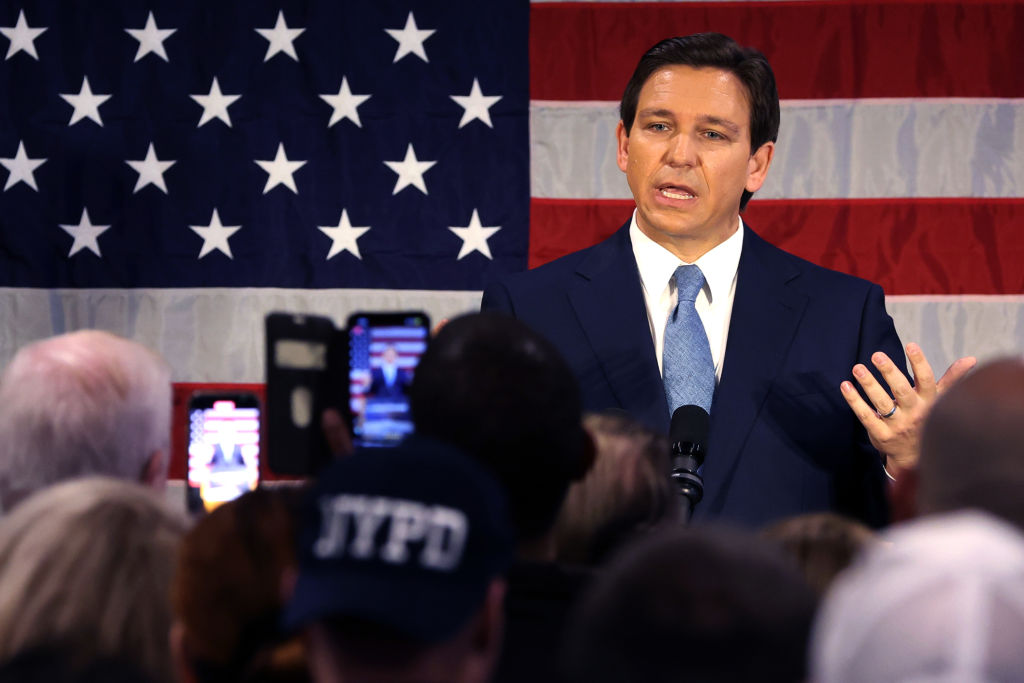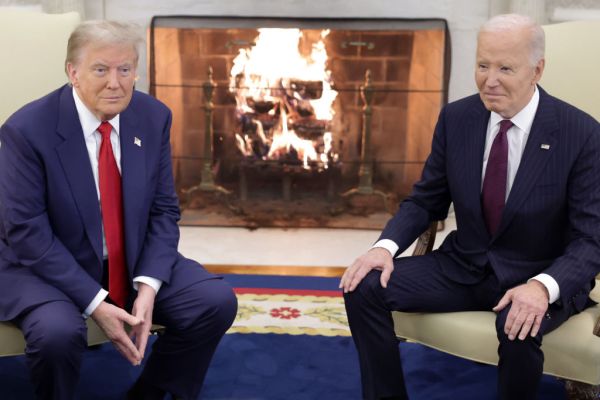Strong partisans glorify their party’s presidential nominee. The rest of us get to yes by rationalizing the nominee’s deficiencies. If you’re troubled by a position your candidate has taken, take a breath, count to 10, and repeat the incantation: He’ll grow in office.
Sometimes he does. Progressives dismayed by Barack Obama’s opposition to gay marriage in 2008 assured themselves that he was saying what he had to say to get elected. He would reveal his true feelings in time, once he had gained the advantage of incumbency. They were correct.
Conservatives dismayed by, well, everything about Donald Trump in 2016 assured themselves that the presidency would domesticate him. Policy sherpas like Mitch McConnell and Paul Ryan would lead him to a Reaganite agenda and sage advisers like James Mattis would restrain his most illiberal impulses. They were not correct.
But they did get three pro-life justices on the Supreme Court and an end to Roe v. Wade. All’s well that ends well, the occasional seditious conspiracy aside.
If you’re a Republican defense hawk who believes Ron DeSantis is the last best hope to end Trump’s political career, prepare to spend many hours over the next 16 months convincing yourself that he’ll grow in office.
DeSantis kept quiet about the war in Ukraine during the past year for sound strategic reasons. There’s a rift on the right over how much aid the U.S. should supply to Ukrainian forces or whether it should supply aid at all. Old-school Cold Warriors want to wreck Russia; “America First” isolationists and their post-liberal Putinist fellow travelers want to turn off the tap; everyone else is torn between their instinct to project “strength” abroad and their instinct to oppose anything supported by Joe Biden and his party.
There was no benefit to a governor who faced reelection in November in taking any side of that fight. Doing so would have achieved nothing for DeSantis except to alienate some faction or another that otherwise would have supported giving him a second term in Florida.
Silence was golden. But now that he’s a soon-to-be presidential candidate, the moment to take sides in Republican infighting over foreign policy has arrived.
On Monday, while the president was strolling around Kyiv as air-raid sirens sounded, the governor took the opportunity to counterprogram him in an interview on Fox News. If you missed it, watch the first three minutes of this clip. It’s an early glimpse at how one of the three or four people most likely to become the next commander-in-chief is apt to handle the Ukrainian conflict.
Oh dear.
“Ron DeSantis Goes Full Trump on Ukraine,” Jonathan Chait writes today at New York magazine. That’s not quite true, but it’s more true than false.
Although there was nominal suspense about where DeSantis might end up on the war, his general M.O. left no real mystery to it. I quote myself: “He chases whatever ideological fad the populists in his party happen to be chasing at a given moment and then tries to be 20 percent ‘extra’ about it.” If Trump’s voters were foursquare behind pulverizing Russia, DeSantis would be the loudest hawk in the party. If Trump’s voters were hellbent on Ukrainian capitulation, DeSantis would sound like one of those nuts on Russian TV.
Out-populist-ing his rivals is his one neat trick as a politician. A decade ago, when small government was the rage among grassroots Republicans, DeSantis was to the right of Paul Ryan on entitlements. (Which may end up costing him his party’s nomination in 2024, incidentally.) As Trumpism took over the party, he reprioritized and made himself into the most aggressive culture warrior of any major Republican officeholder. I suspect he’s spent months keeping his powder dry on Ukraine in hopes that some sort of consensus position would shake out among the base before electoral circumstances required him to start weighing in on it.
But it didn’t. Polls vary on how committed Republican voters are to helping Ukrainians, with some showing continued majority support and others showing majority opposition, but all agree that there’s considerable backing for both positions in the party. That leaves a populist panderer like DeSantis with a dilemma: When your instincts are to always feed the base but your electoral strategy calls for consolidating the traditional conservative bloc behind you, how do you square the circle on Ukraine? How do you appeal to Trump’s “America Firsters” and to Haley-curious Cold Warriors?
Answer: You offer a broadly MAGA take on the war peppered with Reaganite complaints about Democratic wimpiness, hoping that the latter will be just enough to convince Cold Warriors that—deep breath—you’ll grow once in office.
We know what “full Trump” sounds like on Ukraine. It involves praising Russia’s debacle as “genius” and “savvy,” touting your “very good relationship” with Vladimir Putin, and calling for limiting weapons shipments to Ukraine in order to force a Ukrainian capitulation, i.e. “peace.” That wasn’t DeSantis in the Fox interview. He began by faulting the Obama/Biden administration for not sending enough weapons to Ukraine in 2014 and ended by calling the war a catastrophe for Russia in so many words, one which he believes most Russians secretly oppose.
He didn’t call for cutting off Ukraine, and he didn’t admire Putin’s war of conquest as a demonstration of “strength.” By the standards of modern right-wing populism, that practically qualifies as hawkish. It’s also in line with what DeSantis said shortly after Russia invaded, when he derided Russia’s czar as an “authoritarian gas-station attendant.”
You haven’t really gone “full Trump” until you’re willing to spit-shine Putin’s shoes.
But you can be “mostly Trump” without a shinebox. And if you were looking to summarize Ron DeSantis’ political brand in two words, you could scarcely do better than “mostly Trump.”
Chait ticked through some of DeSantis’ choicer soundbites from the Fox interview.
– He described the Biden administration’s policy as a “blank check,” implying that his administration would restrict or end aid to Kyiv. (“Just saying it’s an open-ended blank check, that is not acceptable.”)
– He dismissed the notion that Russia poses a threat to American allies, interests, or values. (“It’s important to point out the fear of Russia going into NATO countries and all of that, and steamrolling that is not even coming close to happening. I think they’ve shown themselves to be a third-rate military power.”)
– He blamed the invasion not on Vladimir Putin but on Joe Biden. (“I don’t think any of this would have happened, but for the weakness that the president showed during his first year in office, culminating, of course, in the disastrous withdrawal in Afghanistan.”)
– And he used the fallacious conflation of Ukraine’s national sovereignty with immigration policy in the United States, creating an imagined choice between stricter enforcement of the southern border and helping Ukraine.
That’s pretty MAGA. And it doesn’t include the worst part, when DeSantis said, “I don’t think it’s in our interests to be getting into a proxy war with China, getting involved over things like the borderlands or over Crimea.” That does make it sound like he’s willing to cut Ukraine off, at least if China is willing to start supporting Russia’s military. (Which it might be.) That’s a hell of an incentive you’re creating, Ron.
Because DeSantis is such a remorseless panderer, his complaints about the war should be understood less as an earnest strategic view of the conflict than as a grab bag of MAGA grievances and perfunctory partisan criticisms. A would-be Republican nominee can’t go wrong blaming Democratic weakness for the world’s ills; it’s the one foreign policy position that Republican hawks and doves alike appreciate on some level. Just don’t think too hard about it or else you might remember that Trump also intended to withdraw from Afghanistan (quite hastily, per an order he signed before leaving office) and that his populist-flavored GOP is less committed to restraining Russia and China via international alliances than modern Democrats are.
If you believe Putin would have been less likely to attack Ukraine with the free world led by an isolationist who mused about NATO’s obsolescence and found the Kremlin more trustworthy than his own intelligence bureau—and who, lest we forget, once tried to extort Ukrainian President Volodymyr Zelensky by withholding U.S. military aid in exchange for political dirt—you’re probably still into cryptocurrency.
Don’t think too hard about DeSantis’ “blank check” critique either. The story of the war’s first year was Ukraine begging the White House for certain types of weapons, Biden hemming and hawing about those requests, and then finally granting them months after they might have had an optimal impact on the battlefield. Arguably it’s because the administration hasn’t had a “blank check” approach to armaments that the war has dragged on toward a stalemate. And if DeSantis meant to imply that there should be some drop-dead financial limit in U.S. support, he should specify it. Russia would doubtless be curious, as that way they’ll know how long they need to keep fighting before Ukraine will run out of munitions.
The “blank check” point is made frequently by Republican politicians angling for populist votes but all it is, really, is an attempt to be “half-pregnant” about the war. If you can’t bring yourself to call for abandoning Ukraine but you fear pissing off “America Firsters” by supporting the cause full-throatedly, just mumble something about “no blank checks.” There’s a little bit for everyone in that, and DeSantis needs a little bit from every wing of the party to defeat Trump.
To fully grasp how tortured his message on the war is, though, consider how confused he sounded about containing Russia. At one point in the Fox interview he scoffed that the country is a “third-rate power,” implying that we’re spending too much to neutralize what’s ultimately not a serious threat—and, perhaps, that NATO has outlived its usefulness. But Russia has become a “third-rate power” of late only because the Ukrainians have used American weapons to send 200,000 of its troops to the hospital or to the morgue. Its military power was overrated on day one of the war, but it’s a shell of what it was on day 362 thanks to enduring U.S. support.
Still, even as a shell of itself, a sufficiently determined third-rate power can kill lots of people, as Ukrainians have come to learn and as citizens of Belarus and Moldova might soon discover. Putin believes it’s his and his country’s destiny to rebuild a Russian empire, and he appears willing to pay an exorbitant price to fulfill that destiny. A fading power that prevails in Ukraine might be encouraged to push further west and threaten American interests. For a guy who has no trouble understanding how American weakness in Afghanistan might have provoked Putin, DeSantis sure does seem cavalier about what American weakness in Ukraine might provoke.
Meanwhile, he seems to view China as a threat we should both confront and avoid confronting. He complained in the Fox interview about the Chinese spy balloon and observed (correctly) that Russia isn’t “on the same level” of threat to America as China, but he also warned against letting the Ukraine conflict turn into a proxy war between Washington and Beijing. Did he mean we should divert military resources away from Ukraine and toward containing China directly? Or did he mean we should divert military resources away from Ukraine so that we don’t stumble into a conflict with an enemy as formidable as China?
Again, we shouldn’t take any of this too seriously. DeSantis’ goal in speaking with Fox wasn’t to offer his considered thoughts on the war, it was to check as many boxes with as many different right-wing foreign-policy constituencies as he could, even if some of those boxes contradicted others. He evinced general skepticism about U.S. involvement in Ukraine but also made noises designed to make him seem “tough.” He’s not going to give you the “full Trump” but he’s certainly not going to give you the “full McConnell” either.
He’s looking for a sweet spot in which he impresses hawks by evincing mild contempt for Russia and its leader and impresses doves by hinting that he won’t do much more than Trump would as commander-in-chief to restrain the grassroots right’s favorite foreign strongman. “Putin’s main hope has rested on Donald Trump returning to office in 2025. Now he has a second option should Trump falter in the primary,” a gloomy Chait writes of DeSantis’ interview. I wouldn’t go that far but I also wouldn’t bet heavily on President DeSantis doing anything to disappoint his populist base, as that would be wildly out of character. A committed culture warrior wouldn’t dare obstruct Russia as it goes about trying to make the world safe for authoritarianism.
But who knows? Maybe he’ll grow in office.
Or maybe he’ll adapt some of his criticisms of Biden into criticisms of Trump in the coming primary in order to further woo conservative hawks. He could point to Trump’s aborted Afghanistan withdrawal or his warm words for Putin and occasionally Xi Jinping or his idiotic “summit” with Kim Jong-un as examples of provocative weakness in their own right that encouraged aggression by U.S. rivals. “We need to wind down this war in Ukraine,” DeSantis might say, “but you’re kidding yourself if you think Russia would have been scared off from invading by a guy who wanted to be friends with every dictator in the world.” There’s no downside in a Republican primary to arguing that your opponent isn’t intimidating enough to people.
Either way, until there’s another candidate in the field who looks capable of defeating Trump, he’s my candidate and I’m sticking with him. DeSantis 2024: Terrible, but still better than a coup-plotter.








Please note that we at The Dispatch hold ourselves, our work, and our commenters to a higher standard than other places on the internet. We welcome comments that foster genuine debate or discussion—including comments critical of us or our work—but responses that include ad hominem attacks on fellow Dispatch members or are intended to stoke fear and anger may be moderated.
You are currently using a limited time guest pass and do not have access to commenting. Consider subscribing to join the conversation.
With your membership, you only have the ability to comment on The Morning Dispatch articles. Consider upgrading to join the conversation everywhere.